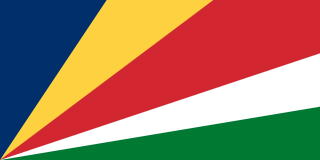Related Research Articles

Seychelles, officially the Republic of Seychelles, is an island country and archipelagic state consisting of 115 islands in the Indian Ocean. Its capital and largest city, Victoria, is 1,500 kilometres east of mainland Africa. Nearby island countries and territories include the Comoros, Madagascar, Mauritius, and the French overseas departments of Mayotte and Réunion to the south; and the Chagos Archipelago and Maldives to the east. Seychelles is the smallest country in Africa as well as the least populated sovereign African country, with an estimated population of 100,600 in 2022.

Lodoicea, commonly known as the sea coconut, coco de mer, or double coconut, is a monotypic genus in the palm family. The sole species, Lodoicea maldivica, is endemic to the islands of Praslin and Curieuse in the Seychelles. It has the largest seed in the plant kingdom. It was also formerly found on the small islets of St Pierre, Chauve-Souris, and Ile Ronde, all located near Praslin, but had become extinct there for a time until recently reintroduced.

GastoniaCommerson ex Lamarck is a formerly accepted genus of plants in the ivy and ginseng family, Araliaceae. It had been known as an unnatural group, but was recognized as late as 2010, when its nine species were distributed to four different subgenera of the large genus Polyscias. Because the genus Gastonia is now obsolete, its species are herein referred to by their names in Polyscias.

Roscheria is an endangered, monotypic genus of flowering plant in the palm family. The genus is named for Albrecht Roscher, a 19th-century German explorer, and the epithet for its single species R. melanochaetes derives from Latin and Greek meaning 'black' and 'bristle', alluding to the spines covering the trunks. They naturally occur on the Mahé and Silhouette Islands of Seychelles where they grow in mountainous rainforest and are threatened by habitat loss.
Glionnetia is a monotypic genus of flowering plants in the family Rubiaceae. The genus contains only one species, viz. Glionnetia sericea, which is endemic to Mahé and Silhouette Island in the Seychelles. The species thrives mainly on high ridges in the mountains and it does not seem to grow well at lower altitudes. Glionnetia sericea is a small flower with paniculate terminal inflorescences and it has capsules that are dispersed by wind.

The Granitic Seychelles are the islands in Seychelles which lie in central position on the Seychelles Bank and are composed of granite rock. They make up the majority of the Inner Islands, which in addition include the coral islands along of the rim of the Seychelles Bank, namely Bird Island and Denis Island. The Granitic Seychelles contrast with the Coralline Seychelles or the Outer Islands, several island groups made up of low coral islands with dry, infertile soils.

Curculigo is a flowering plant genus in the family Hypoxidaceae, first described in 1788. It is widespread across tropical regions of Asia, Africa, Australia, and the Americas.

The Mahé highlands and surrounding areas Important Bird Area occupy the central and north-western part of the island of Mahé in the Seychelles archipelago of the western Indian Ocean.

Verschaffeltiinae is a subtribe of plants in the family Arecaceae endemic to the Seychelles.
Seychellea sechellarum is a species of flowering plant in the family Rubiaceae. It is a shrub endemic to the Seychelles. It is the sole species in genus Seychellea.
References
- ↑ Endemic plants of Seychelles, World Checklist of Vascular Plants (WCVP) checklist builder. Royal Botanic Gardens, Kew. Retrieved 5 September 2024.
- ↑ Brummitt, R. K. (2001). World Geographical Scheme for Recording Plant Distributions (PDF) (2nd ed.). International Working Group on Taxonomic Databases For Plant Sciences (TDWG). Archived from the original (PDF) on 2016-01-25. Retrieved 2021-07-27.